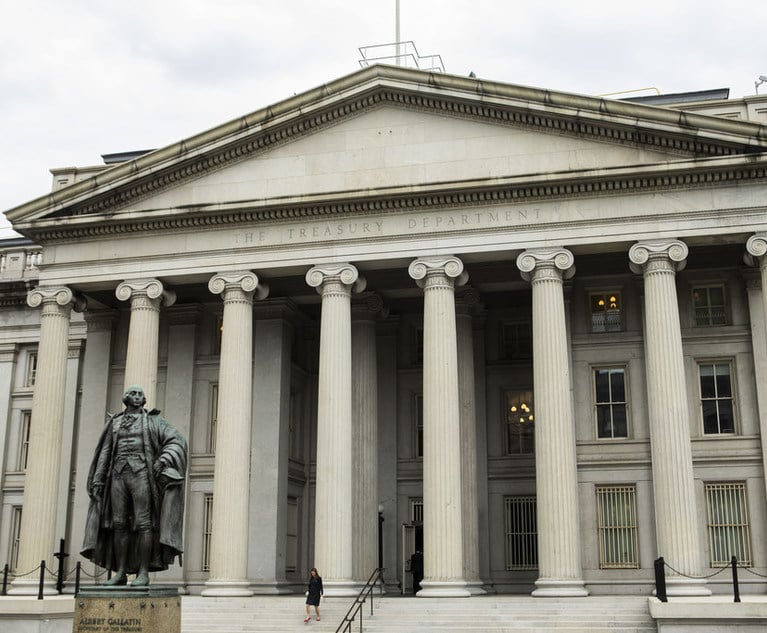Regulatory: Reviewing the Dodd-Frank Whistleblower Program’s 2011 annual report
Section 924(d) of the Dodd-Frank Act requires the Securities and Exchange Commissions (SEC) Office of the Whistleblower to report annually to Congress on whistleblower complaints and its responses.
December 28, 2011 at 04:00 AM
7 minute read
The original version of this story was published on Law.com
Section 924(d) of the Dodd-Frank Act requires the Securities and Exchange Commission's (SEC) Office of the Whistleblower to report annually to Congress on whistleblower complaints and its responses. In November 2011, the SEC issued its inaugural annual report on the Dodd-Frank Whistleblower Program. Because the final rules implementing the Dodd-Frank Act did not become effective until Aug. 12, 2011 and the SEC's fiscal year ended Sept. 30, 2011, the report includes only seven weeks of data describing just 334 whistleblower submissions. Despite the small sample, the report offers a significant takeaway for corporations: internal reporting and compliance programs matter.
Submissions summary
There are a couple of notable metrics included in the report:
1. Geographic origin of submissions The SEC received whistleblower submissions from 37 states and 11 foreign countries. Of the 334 whistleblower submissions, 87 did not report the geographic origin of the submission. Foreign whistleblower submissions, where identified, out-paced all states but California, with the majority originating in China, the U.K. and Australia. Domestically, the largest source of whistleblower submissions was California (34), followed by New York (24) and Florida (19). Given the nation's population and the location of public companies' financial and operational centers, the California and New York numbers are unsurprising.
2. Nature of submissions The report listed 11 different complaint categories. The largest percentage of whistleblower submissions—25.2 percent—were identified as non-descript “other” and “blank” violations. “Market Manipulation” comprised 16.2 percent of the submission complaints, followed by “Offering Fraud” at 15.6 percent and “Corporate Disclosure & Financials” at 15.3 percent. The FCPA category, which pundits have expected to comprise a significant portion of whistleblower submissions under Dodd-Frank, accounted for only 3.9 percent of the submissions.
3 reasons the report calls for effective internal reporting and compliance programs
1. Less submissions received than expected. Though the 334 submissions only represent a seven-week reporting period, the number is lower than most have predicted. Many predicted the Dodd-Frank whistleblower award structure (providing payments between 10 and 30 percent of the SEC's recoveries based on the whistleblower submissions, once the SEC's recovery exceeds $1 million) would lead to a flood of submissions, but that has not been the case. The relatively small number of submissions is likely due to the Dodd-Frank Act's encouragement of internal reporting designed to proactively address complaints by working with the whistleblower before reporting to the SEC.
Consequently, now more than ever, it is important that companies solidify and enhance their internal reporting mechanisms to ensure potential whistleblowers have a meaningful opportunity to resolve potential or reported problems before they reach the SEC.
2. Significant number of foreign country submissions. Of the 334 total submissions, 32 originated abroad. Although the report did not indicate which complaints originated from foreign countries, companies with operations abroad should monitor this activity closely. At the very least, they should ensure their internal reporting and compliance programs are communicated effectively and followed in foreign locations. Companies also should train all employees, regardless of location.
3. Ease of submitting to the SEC. The report subtly emphasizes the ease of making submissions to the SEC. In a footnote, the SEC notes the data reflected in the report represents the information reported by whistleblowers in their online questionnaires or hard copy submissions. Companies should consider this ease of reporting to the SEC when reviewing their internal reporting and compliance programs. Although the Dodd-Frank Act encourages internal reporting, it is not required for a whistleblower to be eligible for an award. Accordingly, the ease of a company's internal reporting mechanisms and possible incentives for whistleblowers to report to the company first, are key in preventing whistleblower submissions to the SEC.
Section 924(d) of the Dodd-Frank Act requires the Securities and Exchange Commission's (SEC) Office of the Whistleblower to report annually to Congress on whistleblower complaints and its responses. In November 2011, the SEC issued its inaugural annual report on the Dodd-Frank Whistleblower Program. Because the final rules implementing the Dodd-Frank Act did not become effective until Aug. 12, 2011 and the SEC's fiscal year ended Sept. 30, 2011, the report includes only seven weeks of data describing just 334 whistleblower submissions. Despite the small sample, the report offers a significant takeaway for corporations: internal reporting and compliance programs matter.
Submissions summary
There are a couple of notable metrics included in the report:
1. Geographic origin of submissions The SEC received whistleblower submissions from 37 states and 11 foreign countries. Of the 334 whistleblower submissions, 87 did not report the geographic origin of the submission. Foreign whistleblower submissions, where identified, out-paced all states but California, with the majority originating in China, the U.K. and Australia. Domestically, the largest source of whistleblower submissions was California (34), followed by
2. Nature of submissions The report listed 11 different complaint categories. The largest percentage of whistleblower submissions—25.2 percent—were identified as non-descript “other” and “blank” violations. “Market Manipulation” comprised 16.2 percent of the submission complaints, followed by “Offering Fraud” at 15.6 percent and “Corporate Disclosure & Financials” at 15.3 percent. The FCPA category, which pundits have expected to comprise a significant portion of whistleblower submissions under Dodd-Frank, accounted for only 3.9 percent of the submissions.
3 reasons the report calls for effective internal reporting and compliance programs
1. Less submissions received than expected. Though the 334 submissions only represent a seven-week reporting period, the number is lower than most have predicted. Many predicted the Dodd-Frank whistleblower award structure (providing payments between 10 and 30 percent of the SEC's recoveries based on the whistleblower submissions, once the SEC's recovery exceeds $1 million) would lead to a flood of submissions, but that has not been the case. The relatively small number of submissions is likely due to the Dodd-Frank Act's encouragement of internal reporting designed to proactively address complaints by working with the whistleblower before reporting to the SEC.
Consequently, now more than ever, it is important that companies solidify and enhance their internal reporting mechanisms to ensure potential whistleblowers have a meaningful opportunity to resolve potential or reported problems before they reach the SEC.
2. Significant number of foreign country submissions. Of the 334 total submissions, 32 originated abroad. Although the report did not indicate which complaints originated from foreign countries, companies with operations abroad should monitor this activity closely. At the very least, they should ensure their internal reporting and compliance programs are communicated effectively and followed in foreign locations. Companies also should train all employees, regardless of location.
3. Ease of submitting to the SEC. The report subtly emphasizes the ease of making submissions to the SEC. In a footnote, the SEC notes the data reflected in the report represents the information reported by whistleblowers in their online questionnaires or hard copy submissions. Companies should consider this ease of reporting to the SEC when reviewing their internal reporting and compliance programs. Although the Dodd-Frank Act encourages internal reporting, it is not required for a whistleblower to be eligible for an award. Accordingly, the ease of a company's internal reporting mechanisms and possible incentives for whistleblowers to report to the company first, are key in preventing whistleblower submissions to the SEC.
This content has been archived. It is available through our partners, LexisNexis® and Bloomberg Law.
To view this content, please continue to their sites.
Not a Lexis Subscriber?
Subscribe Now
Not a Bloomberg Law Subscriber?
Subscribe Now
NOT FOR REPRINT
© 2025 ALM Global, LLC, All Rights Reserved. Request academic re-use from www.copyright.com. All other uses, submit a request to [email protected]. For more information visit Asset & Logo Licensing.
You Might Like
View All
Internal Whistleblowing Surged Globally in 2024, So Why Were US Numbers Flat?
6 minute read
FTC Finalizes Child Online Privacy Rule Updates, But Ferguson Eyes Further Changes

Supreme Court Reinstates Corporate Disclosure Law Pending Challenge
Trending Stories
- 1New York-Based Skadden Team Joins White & Case Group in Mexico City for Citigroup Demerger
- 2No Two Wildfires Alike: Lawyers Take Different Legal Strategies in California
- 3Poop-Themed Dog Toy OK as Parody, but Still Tarnished Jack Daniel’s Brand, Court Says
- 4Meet the New President of NY's Association of Trial Court Jurists
- 5Lawyers' Phones Are Ringing: What Should Employers Do If ICE Raids Their Business?
Who Got The Work
J. Brugh Lower of Gibbons has entered an appearance for industrial equipment supplier Devco Corporation in a pending trademark infringement lawsuit. The suit, accusing the defendant of selling knock-off Graco products, was filed Dec. 18 in New Jersey District Court by Rivkin Radler on behalf of Graco Inc. and Graco Minnesota. The case, assigned to U.S. District Judge Zahid N. Quraishi, is 3:24-cv-11294, Graco Inc. et al v. Devco Corporation.
Who Got The Work
Rebecca Maller-Stein and Kent A. Yalowitz of Arnold & Porter Kaye Scholer have entered their appearances for Hanaco Venture Capital and its executives, Lior Prosor and David Frankel, in a pending securities lawsuit. The action, filed on Dec. 24 in New York Southern District Court by Zell, Aron & Co. on behalf of Goldeneye Advisors, accuses the defendants of negligently and fraudulently managing the plaintiff's $1 million investment. The case, assigned to U.S. District Judge Vernon S. Broderick, is 1:24-cv-09918, Goldeneye Advisors, LLC v. Hanaco Venture Capital, Ltd. et al.
Who Got The Work
Attorneys from A&O Shearman has stepped in as defense counsel for Toronto-Dominion Bank and other defendants in a pending securities class action. The suit, filed Dec. 11 in New York Southern District Court by Bleichmar Fonti & Auld, accuses the defendants of concealing the bank's 'pervasive' deficiencies in regards to its compliance with the Bank Secrecy Act and the quality of its anti-money laundering controls. The case, assigned to U.S. District Judge Arun Subramanian, is 1:24-cv-09445, Gonzalez v. The Toronto-Dominion Bank et al.
Who Got The Work
Crown Castle International, a Pennsylvania company providing shared communications infrastructure, has turned to Luke D. Wolf of Gordon Rees Scully Mansukhani to fend off a pending breach-of-contract lawsuit. The court action, filed Nov. 25 in Michigan Eastern District Court by Hooper Hathaway PC on behalf of The Town Residences LLC, accuses Crown Castle of failing to transfer approximately $30,000 in utility payments from T-Mobile in breach of a roof-top lease and assignment agreement. The case, assigned to U.S. District Judge Susan K. Declercq, is 2:24-cv-13131, The Town Residences LLC v. T-Mobile US, Inc. et al.
Who Got The Work
Wilfred P. Coronato and Daniel M. Schwartz of McCarter & English have stepped in as defense counsel to Electrolux Home Products Inc. in a pending product liability lawsuit. The court action, filed Nov. 26 in New York Eastern District Court by Poulos Lopiccolo PC and Nagel Rice LLP on behalf of David Stern, alleges that the defendant's refrigerators’ drawers and shelving repeatedly break and fall apart within months after purchase. The case, assigned to U.S. District Judge Joan M. Azrack, is 2:24-cv-08204, Stern v. Electrolux Home Products, Inc.
Featured Firms
Law Offices of Gary Martin Hays & Associates, P.C.
(470) 294-1674
Law Offices of Mark E. Salomone
(857) 444-6468
Smith & Hassler
(713) 739-1250







